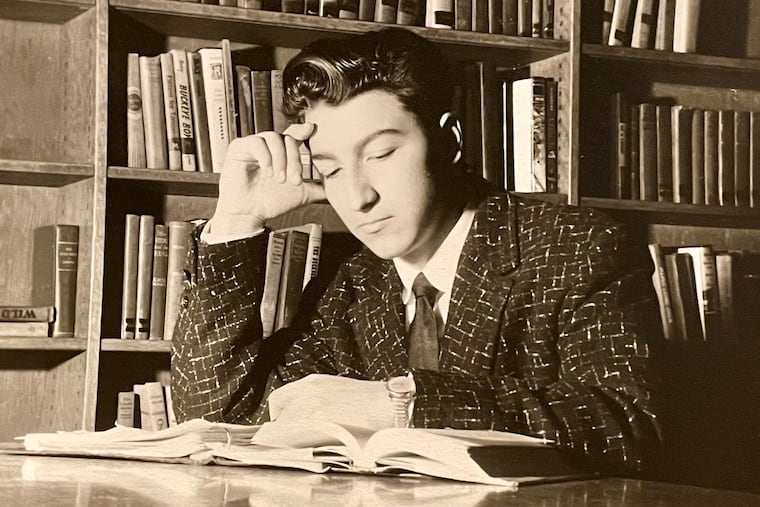David M. Capuzzi, pioneering medical researcher, retired professor of medicine and biochemistry, and physician, has died at 85
He focused largely on cholesterol issues and established training programs for cardiologists and internships in his research lab for promising high school students. “What we do early on prevents premature cardiovascular disease,” he said.

David M. Capuzzi, 85, formerly of Haverford, pioneering medical researcher for more than four decades, retired professor of medicine and biochemistry, former disease prevention program director, and longtime physician, died Thursday, Feb. 15, of complications from Alzheimer’s disease at his home in Wayne.
Curious and kindhearted, energetic and collaborative, Dr. Capuzzi tended to sick and injured birds and other wildlife as a boy on the beach in Wildwood Crest, and went on to become an expert in endocrinology and cardiology in Philadelphia. He was an educational innovator and a champion of what he called “a hands-on view of what the research process is,” and his groundbreaking investigations into cholesterol, triglycerides, heart disease, and related subjects resulted in further inquiry, improved treatment, and more effective drugs.
He focused on disease prevention, established the region’s first high cholesterol training program for cardiology fellows, and initiated countless studies and clinical trials. He also joined other doctors, nutrition counselors, authors, and health care providers of all kinds at free pubic wellness workshops at hospitals and universities.
He was big on teamwork, and his research lab, he said, had an open door. He brought high school interns into his programs and told The Inquirer in 1984: “I think students improve the overall atmosphere. At the high school level, the important thing is to learn the techniques and to learn from people around you rather than just being off on your own on a project.”
He earned his medical degree at Jefferson Medical College in 1964 and a doctorate in physiological chemistry at the Johns Hopkins University School of Medicine in 1969. He served as chairman of research at the Lankenau Medical Research Center, director of the Lipids Disorders Center at the Medical College of Pennsylvania, and director of the Cardiovascular Disease Prevention Center at Thomas Jefferson University Hospital.
He also taught at the University of Pennsylvania School of Medicine, now Perelman School of Medicine, and what became Allegheny University of the Health Sciences. He served on advisory panels for the U.S. Food and Drug Administration and private companies, and was active with the National Lipid Association, American Board of Clinical Lipidology, and other groups.
He received awards and grants, wrote scholarly papers and book chapters, and was quoted often about his work in The Inquirer, Daily News, and elsewhere. He was featured in a 1988 story in The Inquirer about high cholesterol in children and said: “I’ve given dietary information to teenagers eating junk foods and have explained what the problems are, and you’d be surprised how some kids respond to that.”
His daughter, Joan, said Dr. Capuzzi often gave patients his home phone number, so late-night calls were not uncommon. He retired about 12 years ago.
“He was exceedingly caring,” his daughter said. “He helped so many people on the side in addition to his clinical practice.”
Born Jan. 3, 1939, David Michael Capuzzi grew up in South Philadelphia. He fished and crabbed in the summers, and sold newspapers on the boardwalk in Wildwood Crest as a boy.
He won academic awards in high school and college, graduated from St. Joseph’s Preparatory School, and earned a bachelor’s degree in biology on an academic scholarship at St. Joseph’s College, now St. Joseph’s University. He was a lifeguard and medic during high school and college, and considered a career as a marine biologist at first.
He met Ruth Squillace, and they married in 1964, and had daughters Joan and Jennifer, and son David. They lived in Haverford for 34 years before moving to Wayne eight years ago.
Dr. Capuzzi played chess and the trumpet in college, and amassed an impressive collection of American Flyer model trains. He loved animals and birds, and was a night owl himself as an adult.
He was especially close to his grandmother, Anna D’Urso, and relished his time near the sea in Avalon with family and friends. “He was unassuming, warm, easygoing, and open-minded,” his family said in a tribute. “He loved to laugh, and he embraced silliness. David made an art form of being humble.”
His daughter said: “He was the most devoted and caring father anyone could have had.”
In addition to his wife and children, Dr. Capuzzi is survived by seven grandchildren, a brother, and other relatives.
Visitation with the family is to be from 9:30 to 11 a.m. Saturday, Feb. 24, at St. Katharine of Siena Church, 104 S. Aberdeen Ave., Wayne, Pa. 19087. A service is to follow.
Donations in his name may be made to the Dr. Barry Rovner Alzheimer’s Disease Research and Education Fund, Jefferson Office of Institutional Advancement, Dept. 825434, PO Box 71331, Philadelphia, Pa. 19176.